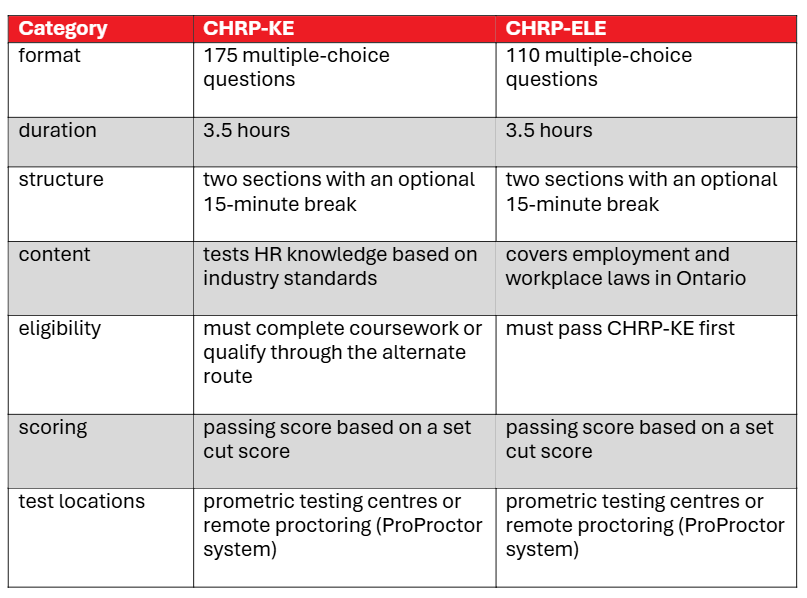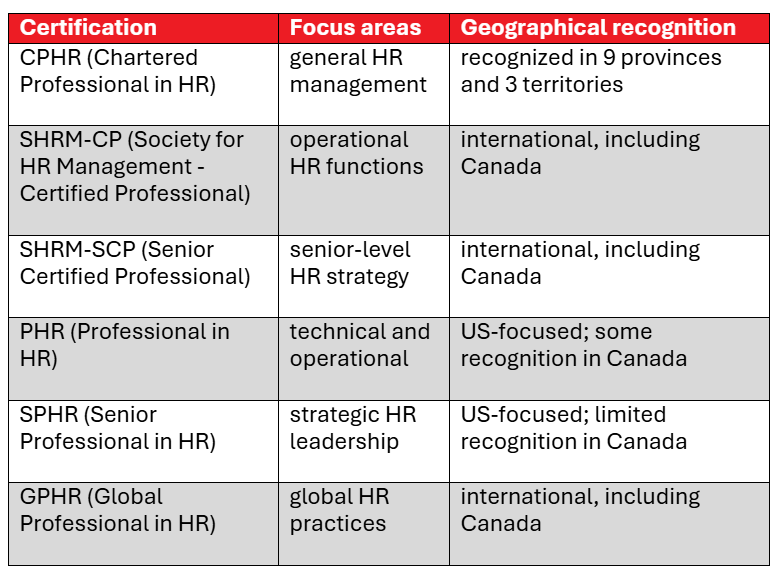
Thinking about earning your CHRP designation in Canada? Learn why it matters, the certification process, and how it can advance your HR career

In the world of professional development, designations are more than just titles. They represent expertise, credibility, and a commitment to excellence. The Certified Human Resources Professional (CHRP) designation is no exception as it sets a standard for HR professionals in Canada.
But there is ongoing discussion about whether it is the best credential to have, or if it even matters to get one. Questions about how hard it is to get and whether it truly measures competence are widely debated in HR.
This article will answer these questions to explore why the CHRP designation, Ontario’s most recognized HR credential, matters in the industry.
The Certified Human Resources Professional (CHRP) designation is a certification that proves an individual has foundational knowledge in human resources.
One needs a certain number of courses and passed exams to get it. Once obtained, it also requires yearly membership renewal and continuing professional development (CPD) hours every three years.
This entry-level HR credential in Ontario is useful for roles like assistant staffing coordinator. It focuses on core HR functions like recruitment, employee relations, and workplace policies.
The designation was created by the Human Resources Professionals Association (HRPA). It is a regulatory body that oversees and certifies HR professionals in Ontario. The RHRPA Act (2013) sets the framework, placing HR on the same level as other recognized professions.
Keep an eye out for HR webinars – some of them, like this employment law masterclass, qualify for CPD credits.
There are three-tiered designations that the HRPA developed:
These designations have helped HR professionals gain credibility and grow in their careers since their introduction in 2014.
Some still contend the actual value of and need for these certifications. This has led to conversations about their true relevance in the HR field.
Many employers view the CHRP designation as proof of an HR professional’s knowledge and ensures readiness for workplace challenges. It reflects a commitment to career-long learning through ongoing education, skills training, coursework, and more.
Some companies prefer CHRP-certified professionals because they tend to see it as the most straightforward sign of a person's qualifications. This can help people keep their jobs longer and find more opportunities.
Jobseekers also recognize the need for credentials, as shown by 2024 resume trends, where they are adding more details to their resumes. They are including sections such as:
The CHRP designation is a clear way to highlight a candidate’s skills. It can help you stand out in a competitive job market.
Here’s more proof of its value: a number of top HR executives and leaders from Canada hold CHRP and CHRL designations.
Here’s a step-by-step guide on how to get your CHRP designation:
You must be a registered member of HRPA in good standing. Your membership must stay active throughout the certification process.
Under the standard route, you complete nine HR courses with at least 65 percent in each and an overall 70 percent average. These courses include:
If you’re an experienced HR professional, you can qualify under the alternate route based on education, work experience, or other HR designations.
A third option is to take the challenge exam. Instead of completing coursework, you’ll need to pass an exam that tests knowledge in the required subjects.
The CHRP-KE tests HR knowledge based on industry standards. You must complete coursework or qualify through the alternate route before taking this exam.
The CHRP-ELE covers employment and workplace laws in Ontario. It can only be taken after passing the CHRP-KE.
The Job Ready Program consists of four online modules that prepare candidates for real HR work, which include:
The program takes about four hours to finish. It’s free for HRPA members who have passed the ELE.
Here’s other basic information about the CHRP-KE and CHRP-ELE:  Additional information on CHRP designation
Additional information on CHRP designation
You don’t need a college or university degree for the CHRP designation, but many employers prefer it.
Post-secondary education is not required to complete the nine coursework requirements. Some institutions offer programs specifically for those pursuing the CHRP designation.
Remember to follow all HRPA guidelines and maintain membership and continuing education. You can earn the CHRP designation and improve your career opportunities by working through this process.
It typically takes one to two years to earn the CHRP designation, but the actual duration depends on individual circumstances. The HRPA designed the process to be flexible.
The estimated timeframes for the main processes are outlined below:
Coursework completion
You can take one course at a time or multiple courses at once, depending on your schedule. Each course typically lasts 12 to 14 weeks. There are certain alternatives to this, such as:
If you’re looking for a faster option, accelerated CHRP programs are available. Schools like York University and Centennial College offer full-time certificate programs that you can complete within eight to 12 months.
Exam preparation
You would typically study for three to four months before writing the CHRP-KE. The CHRP-ELE is typically taken within weeks or months after passing the CHRP-KE.
Job Ready Program
This must be completed after passing both exams and takes about four hours to finish.
The total duration of the entire process generally takes one to two years. You’ll need to consider factors like individual pacing and exam scheduling.
No, the CHRP designation does not expire. But you must keep your HRPA membership active and complete CPD. If you do not, your designation may be suspended or revoked.
The CHRP designation shows that you’re serious about the field. It shows that you’re willing to invest in something that holds value in the industry and community.
It is not the only HR credential that may prove this. Others include: 
Yes, you can keep both credentials. HRPA membership is available to CHRP holders outside of Ontario. The annual membership cost will depend on the registration class and membership status.
While the CHRP designation adds credibility, it is not required for success in HR. Many professionals advance through experience and industry connections alone.
The HRPA survey found that 25 percent of HR professionals do not hold an HR designation. It shows that real-world experience can be valuable as well.
However, for better career opportunities, having both experience and a recognized designation can provide a competitive edge.
These are some of the perks that come with earning the title:
A CHRP designation makes it easier to move up the HR career ladder faster. Mid-level and senior HR roles (HR manager, HR business partner, director) naturally pay more, and many of these roles either require or prefer a CHRP.
Many hiring managers do not have time to assess every applicant’s skills in depth. When they see a CHRP designation, it acts as an easy filter.
A CHRP automatically suggests a baseline of HR knowledge. This means that an employer may assume that the certified candidate is more prepared than a non-certified one.
Having a CHRP designation gives you exclusive access to HRPA’s research, industry reports, and legal updates that non-members do not. This keeps you informed about HR trends, compliance changes, and best practices in Canada.
If you’re in client-facing HR roles, such as HR business partners (HRBP) or generalists, the resources offered by HRPA can be highly valuable.
Those within HRPA’s sphere have the opportunity to network with like-minded professionals. Through the annual conference, chapter events, workshops, and webinars, members can connect and share insights.
In the 2022 HR Trends Survey conducted by the HRPA, 75 percent of HR professionals in Ontario hold an HR designation.
According to the report, 83 percent of designated professionals pursued it for better job opportunities and career growth.
These are just some of the advantages that make the CHRP designation a key asset for professionals who choose to have it. But some still have concerns about the hassle of getting it, keeping it, and its actual worth.
The CHRP designation is widely recognized in HR, but not everyone agrees on its value. Some report concerns about:
Although these issues affected only a few, many still believe that the accolade helped them make a positive impression on their managers.
But others argue that CHRP is not the only HR certification in Ontario. They see other HR designations as good alternatives.
The advantage of having a CHRP title at the end of one’s name is more than just getting hired. Due to the rigorous studying and training required for such an accomplishment, the payoff proves to be worthwhile.
The CHRP designation, like other credentials, can improve your prospects of getting hired. But employers also consider other factors, like:
If you’re interested in advancing your HR career through a CHRP designation, check the HRPA website for registration details and next steps.
Do you think that having a CHRP designation would help in building a career in HR? Let us know in the comments below.